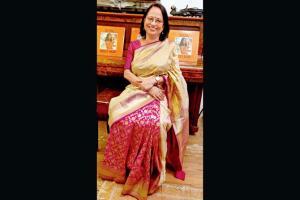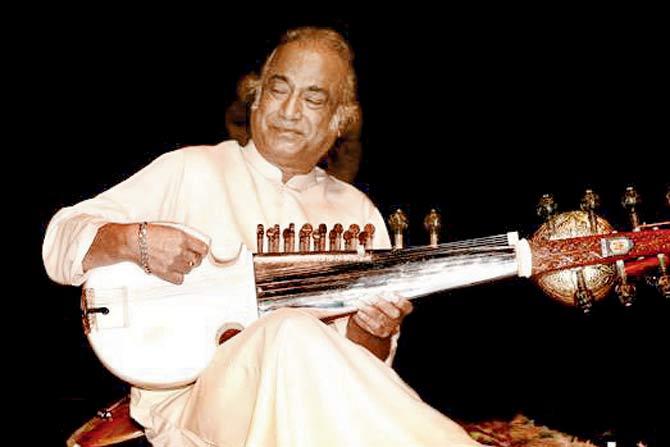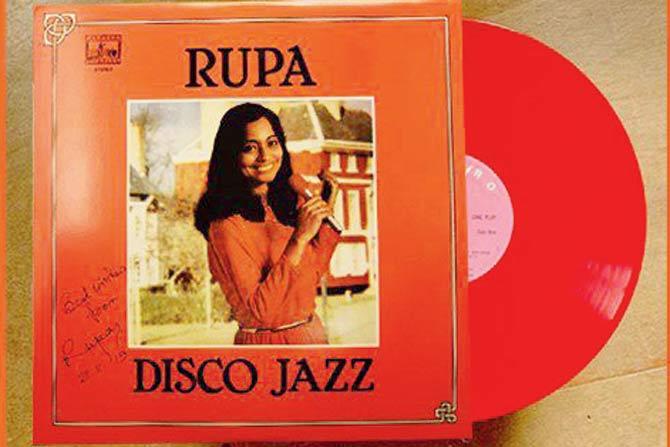On her visit to Mumbai, we share the story of an unsung musician from the 1980s who has finally got her rightful share of the spotlight

Pic/ Shunashir Sen
Let's hedge a bet. You've never heard of Rupa Biswas. It's great if you have. But if you haven't, it's understandable. In 1982, Biswas — now Sen after marriage — released an album called Disco Jazz. It might just be one of the best pre-Internet Indian records you've never heard. The reason is all down to unfortunate timing. Nazia Hassan had burst onto the scene around the same point with Disco Deewane — an album that captured the popular imagination with its "aha" factor — and with Aap Jaisa Koi, the runaway Hindi hit. Sen, then a middle-class Bengali girl in her mid-20s with no marketing backing to speak of, stood no chance. But let that not take away from the fact that she was responsible for a genuine work of art. There in fact isn't a single piece of recorded music in history that falls roughly under the bracket of disco, has an electric sarod as its sonic backbone, and has lyrics that comprise basic Bengali words. How did it all come about, though? Sitting resplendent in a silk saree at a Mahim record store called The Revolver Club, where she had come down earlier this week for a meet-and-greet session (we'll get to how the digital age helped her gain the recognition she deserved 40 years ago), Sen travels back in time to narrate her one-of-a-kind story to us.
ADVERTISEMENT
 Ustad Aashish Khan realised Sen's potential and arranged the record
Ustad Aashish Khan realised Sen's potential and arranged the record
It all started in Malda, West Bengal. That's where her magistrate father was posted when she was born. Sen's mother was a trained singer, who inculcated the habit of music in both her daughters from an early age. Wherever her father was transferred — it was Behrampore from Malda and lastly Kolkata — Sen received training in Indian classical music from the finest teachers available, such as Sudhin Dasgupta. It's important to note this. Remember that this was a time when access to western music was as improbable in India as finding an elephant would be on the streets of London. The only foreign band Sen had heard till then was The Beatles. But it's her Indian classical background that gave her the versatility she needed when — while on a family holiday to her elder brother's home in Calgary — the seeds of Disco Jazz were sown.
Enter Aashish Khan. The son of legendary sarod player Ali Akbar Khan, he was in the audience when Sen performed a ghazal concert in the Canadian city after being coaxed by her kin. A maestro in his own right, Khan realised that Sen, musically speaking, was a diamond he could chisel. But time was of the essence. The Biswas's were due to leave Canada for England for the second leg of their holiday. So he hurriedly got together a crack team of local musicians and after jamming together in Sen's brother's home for a few days, bundled her into a recording studio to sing four tracks that his wife had penned the lyrics for. These were eventually turned into the only album that would ever bear Sen's name — as Rupa Biswas.
But don't ask what genre it falls under. There are disco elements in it, to be sure. You might even find a smattering of jazz if you listen hard enough. Let's not fall into the trap of "fusion", though, since it's too easy a word.
 Sen wore a dress for the first time for the album cover of Disco Jazz
Sen wore a dress for the first time for the album cover of Disco Jazz
The point is that Sen, by her own admission, had tremendous fun in that recording studio singing a style of music that was completely alien to her. The sound is infectious. Play the album on a streaming service today (it's best if you lay your hands on the actual record) and you can get a party started at the drop of a hat. This isn't a personal opinion. Even acclaimed global musicians like Daphni have sampled her songs, which have garnered a cult following online after Disco Jazz was reissued in the US a few years ago. Sen can't quite grasp the impact she's had on a 21st century audience, though. "I was initially sad after my album didn't take off, but I quickly settled down to start a family and was happy singing Bengali and ghazal songs at concerts in Kolkata later," she tells us sitting at The Revolver Club. Her album is playing on loop as we converse. A foreign guest cuts in at one point to bid goodbye and reiterate what a fan he is. Sen, a soft-spoken woman of impeccable manners, accepts the compliment in all graciousness. That lone interaction itself is testament to how she is gradually finding her rightful place under the sun. Yes, it's taken almost 40 years. But hey, it's better late than never.
Catch up on all the latest Mumbai news, crime news, current affairs, and also a complete guide on Mumbai from food to things to do and events across the city here. Also download the new mid-day Android and iOS apps to get latest updates
 Subscribe today by clicking the link and stay updated with the latest news!" Click here!
Subscribe today by clicking the link and stay updated with the latest news!" Click here!






